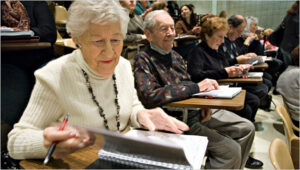Enrolling in college for the first time or returning to school after a lengthy absence presents many difficulties for the older student. Difficulties-not disadvantages, it is always to your advantage to want to return to school to further your education.
Objective Disadvantages
Objective problems are the easiest to overcome.
- For financial questions, there will always be a financial aid department which can advise how to apply for student loans, grants, and scholarships.
- The university has a disability office, and if there is a problem with hearing or vision, special assistants are provided to transcribe and help with note taking.
- There are handicap parking spaces, and help will be provided for access problems if there are problems with walking and getting around.
- If the older student is unfamiliar with some of the new technology, there are monitors available in the computer labs, and tutors can be provided to work with the student outside of his or her classes and to help catch up with some knowledge that may need to be filled in.
- There is an academic advisor available to help with decisions about the degree program.
- There is usually a student health services where help can be sought for emotional and physical problems.
An older student returning to college after many years’ absence may have more health issues than younger students, skill sets that need to be updated, and unfamiliar technology, to name a few.
Objective difficulties can sometimes be easier to overcome than subjective difficulties, because the latter are usually emotional and psychological which take the strength of will and confidence to overcome.
Subjective Disadvantages
Subjectively, there are emotional issues, personal motives, and the importance of social interaction.
A university may have a program to try to make non-traditional students feel more accepted. They try but don’t succeed too well.
One reason the program does not succeed is the attitude of the nontraditional students themselves. There is a large age spread-nontraditional is considered aged twenty-five and up for university statistics.
- But in the social sphere, the students in their twenties may already be married or if single, have to go to work right after classes, and their weekends are spent socializing.
- The students in their thirties and forties are more often graduate students who already have families and have returned to school to improve their career opportunities.
Between trying to work, keep up with schoolwork and spend time with their families, they do not have time to hang out and socialize with the other nontraditional students.
As the age of the student rises, the more difficult it is to make friends.
Nowadays the fifties plus are usually not interested in any social interactions on campus unless enrolled in a post-graduate program working on a Masters or Doctorate, in which case they are involved in the academic and alumnae groups.
The older male student has no problem from a social viewpoint. If he is married, it’s school and home to family. Otherwise, there is a whole campus of women of all ages, many unmarried, to meet.
The single older woman is the most isolated.
It is difficult for her to make friends because the younger students are not interested in being around her, there are too many younger women available for the few older single male students, and the few older women students who are single nowadays live with their mothers.
The best course for the single older woman on campus is to make up her mind to succeed academically. Dwelling on feeling isolated will only divert energy from the purpose for which she enrolled in the university, to learn more and build her career.
A good option is to join a club.
There are clubs that are open to anyone. Once people get used to her, age differences become less important. Some are subject focused, such as a language club. Getting together to practice speaking a new language will provide the opportunity to meet others. She can also look for a campus job or volunteer to help the school newspaper, volunteer at campus events and join committees, get involved in political groups and special interest groups.
It can be lonely for the older student, they can feel isolated and sometimes give in to feelings of futility.
Emotional problems can interfere with studying because people who are depressed stop problem solving and spend more time worrying than studying.
The most important thing for older students is to keep focused on the goal that brought them to school.
Graduating with the degree that was the reason for going back to school brings the reward of a feeling of achievement and personal success.

